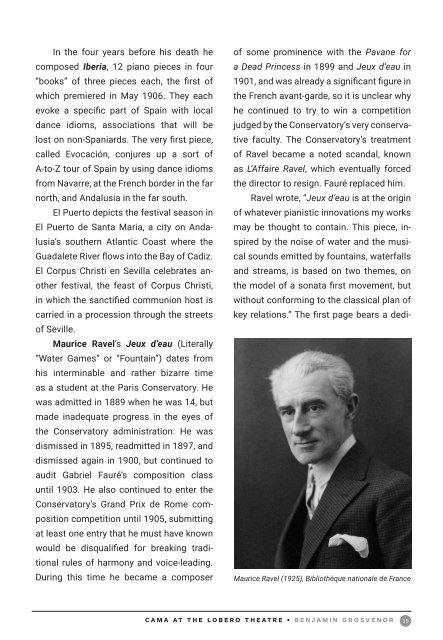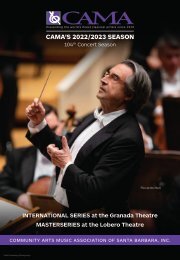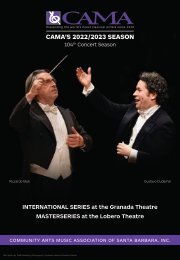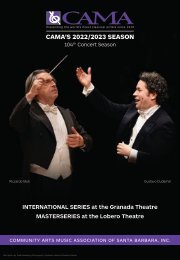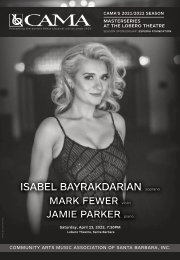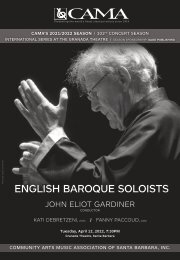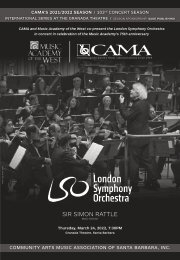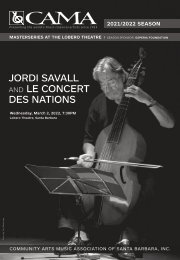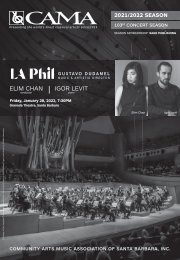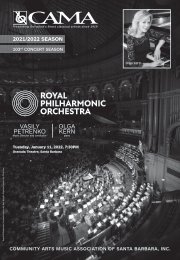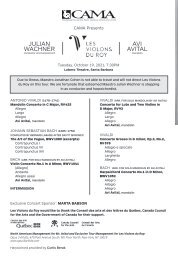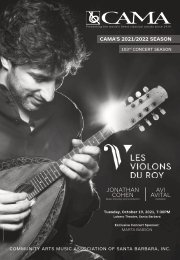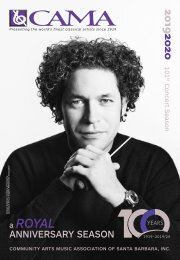CAMA's Masterseries Presents Benjamin Grosvenor, piano ⫽ Friday, March 18, 2022 ⫽ Lobero Theatre, Santa Barbara ⫽ 7:30PM
FRIDAY, MARCH 18, 2022, 7:30PM CAMA's Masterseries Presents BENJAMIN GROSVENOR, piano “His solo recitals recall an earlier generation of wizards of the piano.” —Financial Times British pianist Benjamin Grosvenor (b.1992) has been described as “the best pianist to come out of England in the last 50 years.” One only needs to listen to his playing to understand that the accolades are well deserved. Grosvenor’s promise was evident from a young age; he was the winner of the Keyboard Final of the 2004 BBC Young Musician Competition at the age of eleven, and was invited to perform with the BBC Symphony Orchestra at the Opening Night of the 2011 BBC Proms at London’s Royal Albert Hall at age nineteen. Turned away from performance by suddenly imposed pandemic precautions while already in Santa Barbara in March 2020, CAMA is delighted to welcome Benjamin Grosvenor back for his proper Santa Barbara and Masterseries debut! PROGRAM: FRANCK: Prélude, Chorale et Fugue, FWV 21 (1884) R. SCHUMANN: Kreisleriana, Op.16 ALBÉNIZ: Iberia, Book I RAVEL: Jeux d’eau RAVEL: La valse •
FRIDAY, MARCH 18, 2022, 7:30PM
CAMA's Masterseries Presents
BENJAMIN GROSVENOR, piano
“His solo recitals recall an earlier generation of wizards of the piano.” —Financial Times
British pianist Benjamin Grosvenor (b.1992) has been described as “the best pianist to come out of England in the last 50 years.” One only needs to listen to his playing to understand that the accolades are well deserved. Grosvenor’s promise was evident from a young age; he was the winner of the Keyboard Final of the 2004 BBC Young Musician Competition at the age of eleven, and was invited to perform with the BBC Symphony Orchestra at the Opening Night of the 2011 BBC Proms at London’s Royal Albert Hall at age nineteen. Turned away from performance by suddenly imposed pandemic precautions while already in Santa Barbara in March 2020, CAMA is delighted to welcome Benjamin Grosvenor back for his proper Santa Barbara and Masterseries debut!
PROGRAM:
FRANCK: Prélude, Chorale et Fugue, FWV 21 (1884)
R. SCHUMANN: Kreisleriana, Op.16
ALBÉNIZ: Iberia, Book I
RAVEL: Jeux d’eau
RAVEL: La valse
•
You also want an ePaper? Increase the reach of your titles
YUMPU automatically turns print PDFs into web optimized ePapers that Google loves.
In the four years before his death he<br />
composed Iberia, 12 piano pieces in four<br />
“books” of three pieces each, the first of<br />
which premiered in May 1906. They each<br />
evoke a specific part of Spain with local<br />
dance idioms, associations that will be<br />
lost on non‐Spaniards. The very first piece,<br />
called Evocación, conjures up a sort of<br />
A‐to‐Z tour of Spain by using dance idioms<br />
from Navarre, at the French border in the far<br />
north, and Andalusia in the far south.<br />
El Puerto depicts the festival season in<br />
El Puerto de Santa Maria, a city on Andalusia’s<br />
southern Atlantic Coast where the<br />
Guadalete River flows into the Bay of Cadiz.<br />
El Corpus Christi en Sevilla celebrates another<br />
festival, the feast of Corpus Christi,<br />
in which the sanctified communion host is<br />
carried in a procession through the streets<br />
of Seville.<br />
Maurice Ravel’s Jeux d’eau (Literally<br />
“Water Games” or “Fountain”) dates from<br />
his interminable and rather bizarre time<br />
as a student at the Paris Conservatory. He<br />
was admitted in 1889 when he was 14, but<br />
made inadequate progress in the eyes of<br />
the Conservatory administration. He was<br />
dismissed in 1895, readmitted in 1897, and<br />
dismissed again in 1900, but continued to<br />
audit Gabriel Fauré’s composition class<br />
until 1903. He also continued to enter the<br />
Conservatory’s Grand Prix de Rome composition<br />
competition until 1905, submitting<br />
at least one entry that he must have known<br />
would be disqualified for breaking traditional<br />
rules of harmony and voice‐leading.<br />
During this time he became a composer<br />
of some prominence with the Pavane for<br />
a Dead Princess in 1899 and Jeux d’eau in<br />
1901, and was already a significant figure in<br />
the French avant‐garde, so it is unclear why<br />
he continued to try to win a competition<br />
judged by the Conservatory’s very conservative<br />
faculty. The Conservatory’s treatment<br />
of Ravel became a noted scandal, known<br />
as L’Affaire Ravel, which eventually forced<br />
the director to resign. Fauré replaced him.<br />
Ravel wrote, “Jeux d’eau is at the origin<br />
of whatever pianistic innovations my works<br />
may be thought to contain. This piece, inspired<br />
by the noise of water and the musical<br />
sounds emitted by fountains, waterfalls<br />
and streams, is based on two themes, on<br />
the model of a sonata first movement, but<br />
without conforming to the classical plan of<br />
key relations.” The first page bears a dedi<br />
Maurice Ravel (1925), Bibliothèque nationale de France<br />
CAMA AT THE LOBERO THEATRE • BENJAMIN GROSVENOR<br />
15


